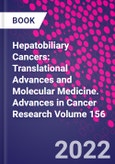Hepatobiliary cancer refers to primary malignant tumors originating in cells of the liver, bile ducts, and gallbladder. Globally, primary liver cancer, which includes hepatocellular carcinoma (~75 % of all cases) and intrahepatic biliary cancer or cholangiocarcinoma (~10-15 % 0f all cases) is the 6th most commonly diagnosed cancer and 3rd leading cause of cancer deaths worldwide. The vast majority of these highly malignant cancers are diagnosed at an advanced stage where� treatment options are limited and patient survival outcomes are poor. The biological and therapeutic challenges posed by hepatobililiary cancers such as hepatocellular carcinoma (HCC)� and cholangiocarcinoma (CCA) are daunting, emphasizing a critical need to review and assess current and evolving basic, translational, and clinical research focused on addressing the critical obstacles that continue to limit progress towards achieving significant improvements in HCC and CCA clinical management and patient survival outcomes. Towards this goal, this special edition of Advances in Cancer Research is focused on providing� a comprehensive, timely and authoritative reviews covering such topics of significant scientific and clinical relevance, including hepatobiliary cancer risk mechanisms and risk-predictive molecular biomarkers; causes and functional intricacies of inter- and intratumor heterogeneity; novel insights into the role of tumor microenvironment and key signaling pathways in� promoting hepatobiliary cancer progression, therapeutic resistance and immunosuppression; emerging biomarkers of HCC and CCA prognosis;� advances in molecular genomics for personalizing tumor classification and targeted therapies;� innovative preclinical cell culture modeling for hepatobiliary cancer drug discovery; and current and emerging trends in hepatobiliary cancer molecular therapeutic targeting and immunotherapies.
Please Note: This is an On Demand product, delivery may take up to 11 working days after payment has been received.
Table of Contents
1. Liver Cancer Risk-Predictive Molecular Biomarkers Specific to Clinico-epidemiological ContextsYujin Hoshida, Naoto Kubota, Naoto Fujiwara
2. Inflammatory Pathways and Hepatobiliary Cancer Risk Mechanisms and Prevention
Mario Strazzabosco and Massimiliamo Cadamuro
3. Causes and Functional Intricacies of Inter- and Intratumor Heterogeneity in Primary Liver Cancers
Xin Wei Wang and Subreen Khatib
4. Implication of Genetic Heterogeneity in Hepatocellular Cancer
Renumathy Dhanasekaran
5. Understanding the Genetic Basis for Cholangiocarcinoma
Lewis R. Roberts and Mikayla A. Schmidt
6. Novel Insights into Molecular and Immune Subtypes of Intrahepatic Cholangiocarcinoma
Daniela Sia and Emily Bramel
7. Cancer-Associated Fibroblasts in Intrahepatic Cholangiocarcinoma Progression and Therapeutic Resistance
Silvia Affo, Aashreya Ravichandra, Sonakshi Bhattacharjee
8. Mechanisms and Clinical Significance of TGF-? in Hepatobiliary Cancer Progression
Lopa Mishra and Zobia Zaidi
9. Matricellular proteins in intrahepatic cholangiocarcinoma
Alphonse Eugene Sirica
10. Yap Activation and Hippo Pathway Signaling in the Pathogenesis and Prognosis of Hepatocellular Carcinoma and Intrahepatic Cholangiocarcinoma
Satdarshan (Paul) Singh Monga, Sungjin Ko, Yuhua Xue, George K. Michalopoulos,
11. Patient-derived Functional Organoids as a Personalized Approach for Drug Screening Against Hepatobiliary Cancers
Florin M. Selaru and Ling Li
12. Molecular Therapeutic Targets for Cholangiocarcinoma: Present Challenges and Future Possibilities
Jesper B. Andersen, Colm J. O'Rourke, Dan H�gdall
13. Immunotherapies for Hepatocellular Carcinoma and Intrahepatic Cholangiocarcinoma: Current and Developing Strategies
Bruno Sangro and Josepmaria Argemi
14. Immunotherapy for Hepatobiliary Cancers: Emerging Targets and Translational Advances
Mitchell Ho, Dan Li, Shaoli Lin, Jessica Hong








